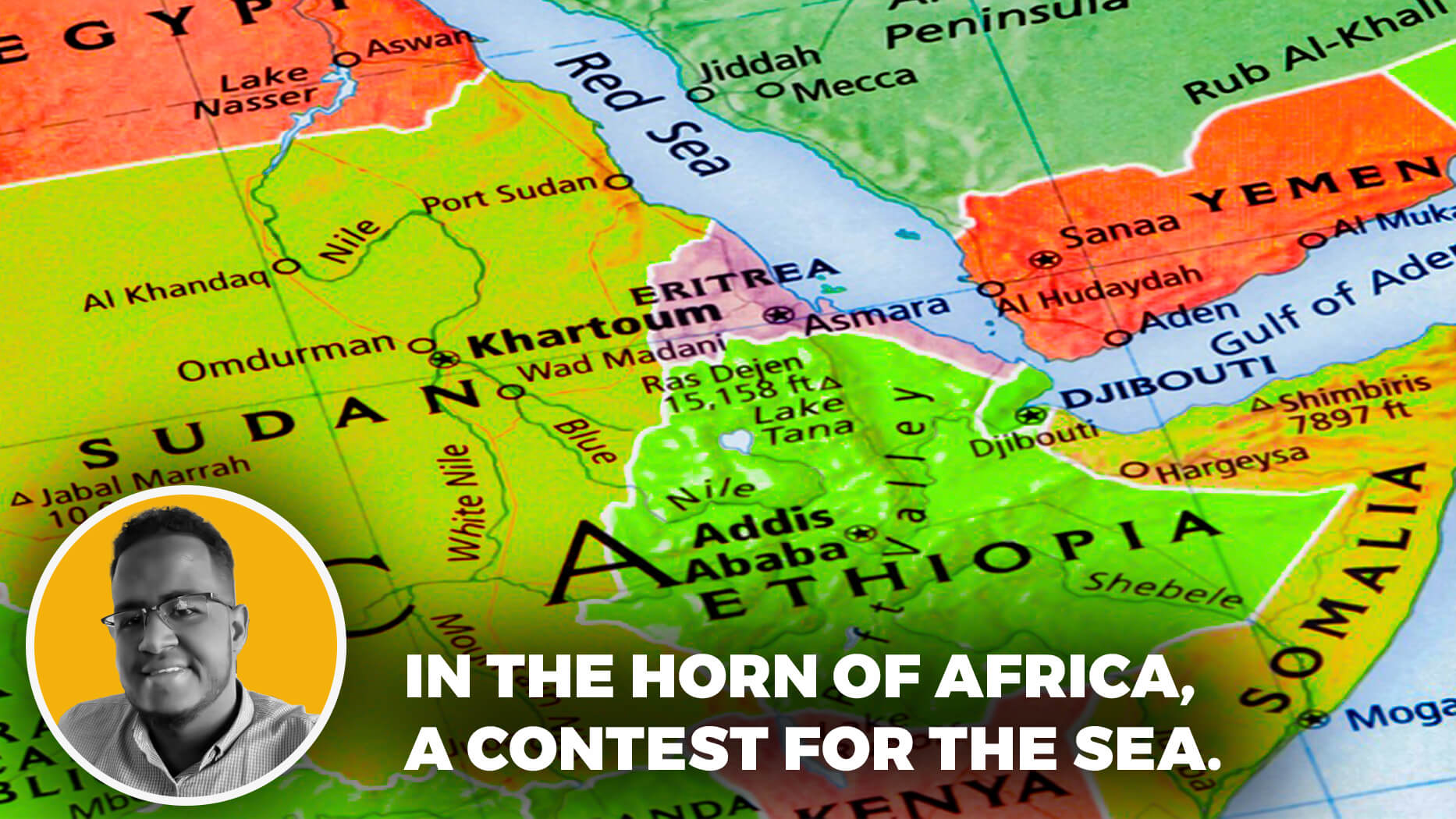In an analysis piece republished by bird story agency, veteran Somali reporter Abdi Guled unpacks the high-stakes struggle unfolding along Somalia’s 2,000-mile coastline, a contest over sea access that could redefine the Horn of Africa.
By Abdi Guled, Mogadishu, Somalia.
From the air, Somalia’s coastline unfurls endlessly, a ribbon of sand and sea stretching more than 2,000 miles from Kenya to Djibouti. That same coastline now lies at the heart of a contest that could define the Horn of Africa for a generation. Its a contest of who controls access to the sea and what that means for sovereignty, alliances, and global power.
The latest spark came in January 2024, when Ethiopia, landlocked since Eritrea’s independence in 1993, signed a surprise Memorandum of Understanding with Somaliland, the breakaway region in northern Somalia.
For Ethiopia, the deal was a bold attempt to break free of its reliance on Djibouti’s ports. For Somaliland, it offered the tantalising promise of recognition. For Somalia’s federal government in Mogadishu, however, it was nothing less than an assault on its territorial integrity.
What might have been a narrow regional dispute has since metastasised into a larger geopolitical contest drawing in Turkey, the Gulf states, and the world’s great powers.
At the heart of the contest is a zero-sum question. Which is, in a neighbourhood crowded with fragile states and ambitious neighbours, can Somalia defend its sovereignty without becoming the stage for a new proxy war?
Ethiopia’s Existential Quest in the Horn of Africa
For Prime Minister Abiy Ahmed of Ethiopia, the sea is not simply an economic concern but an existential one.
“A country of more than 120 million people cannot be left without access to the sea,” he declared last year, framing maritime access as a national destiny.
Ethiopia is located in the northeaster of the Horn of Africa. It’s dependence on Djibouti has become increasingly problematic. Currently 95% of its imports and exports flow through that single corridor to the Red Sea, making Addis Ababa vulnerable to political leverage and logistical bottlenecks.
A Somaliland deal, granting a 20 km strip of leased coastline for 50 years, was presented as a pragmatic solution.
But the cost was geopolitical dynamite. By offering Somaliland recognition, Ethiopia implicitly undermined Somalia’s sovereignty. In Mogadishu, leaders saw echoes of a past in which neighbours carved up Somali territory.
“This is not a port deal,” one Somali diplomat said privately. “This is a question of our existence as a nation.”
Mogadishu’s Counter-Leverage
Unable to confront Ethiopia directly, Somalia, which occupies the easternmost part of the Horn of Africa, sought protection through alliances.
Within weeks, President Hassan Sheikh Mohamud signed a ten-year defence and economic pact with Turkey.
The agreement gives Ankara sweeping rights to patrol Somali waters, develop its navy, and secure its ports.
For Somalia, the pact internationalises the defence of sovereignty. For Turkey, it cements its ambition to be a non-Western power broker in Africa, expanding a presence that already includes a large military base and officer training mission in Mogadishu.
The move also tied Somalia into a wider proxy axis; a Somali–Turkey–Qatar–Egypt alignment, balancing against Ethiopia’s ties with the United Arab Emirates and, more cautiously, with Saudi Arabia.
Gulf States in the Horn
Nowhere are these proxy lines sharper than in the Gulf.
The UAE has cultivated Somaliland and invested heavily in Ethiopian logistics, making Addis Ababa’s bid for sea access a natural fit for Emirati maritime strategy.
Qatar, a close ally of Turkey, has poured money into Mogadishu, offering loans and political backing to the Somali federal government.
Saudi Arabia has oscillated, wary of being pulled into another regional rivalry but conscious of the Red Sea’s centrality to its Vision 2030 economic plans.
Egypt, embroiled in a bitter dispute with Ethiopia over the Nile, has quietly encouraged Mogadishu, seeing an opportunity to stretch Ethiopia thin.
The result is a Horn of Africa whose ports and politics are now extensions of Gulf rivalries, with each investment or security pact doubling as a geopolitical footprint.
Great Powers on the Sidelines
From beyond the region, the great powers are watching carefully.
For the United States, Somalia has long been about counterterrorism. American drones, commandos, and contractors have fought al-Shabab for two decades. Washington now worries that the Ethiopia-Somaliland deal risks unraveling fragile state building efforts.
“You can’t fight al-Shabab if the state itself is under threat,” one Western diplomatic advisor, based in Mogadishu over the phone.
China, by contrast, sees the Horn as part of its Belt and Road vision.
With its first overseas military base in Djibouti and heavy port investments across the Red Sea, Beijing is sensitive to any shift in maritime routes. A Somaliland corridor would offer opportunities, but also risks bringing NATO-aligned Turkey deeper into China’s backyard.
The Horn, once peripheral to global strategy, has become a nexus of Sino-American rivalry, even if neither Washington nor Beijing admits it openly.
Somalia’s Fragile Core on the Horn of Africa
All the while, Somalia itself remains deeply fragile.
Al-Shabab controls swaths of countryside, conducting attacks in Mogadishu and beyond. Political rifts between federal leaders and regional states simmer constantly. The influx of foreign military partners has helped, but it also risks overwhelming the state’s capacity to act independently.
“We are walking a fine line,” said a Somali analyst in Mogadishu.
“If we lean too much on one side, we risk losing sovereignty. If we lean too little, we risk being swallowed.”
For regional analysts, this introduces a new nexus.
The Ethiopia-Somaliland deal was designed to solve a logistical problem. Instead, it has redrawn the geopolitical map of the Horn of Africa.
Experts warn that three scenarios are on the horizon.
Military Standoff: Ethiopia pushes ahead with implementation, triggering Somali resistance and a potential clash along the northern coast.
Proxy Escalation: Gulf states deepen their rivalries in Somali ports, turning the country into a theatre for broader Middle Eastern competition.
Quiet Renegotiation: International pressure forces Ethiopia and Somalia into indirect talks, seeking a face-saving compromise that defuses the crisis.
None is guaranteed. What is certain is that the Horn has moved from the periphery of international attention in the region, to its centre.
In a world where global trade, great power rivalry and fragile states intersect, the contest over Somalia’s seas in the Horn of Africa is no longer a local dispute. It is the latest reminder that in the Horn of Africa, geography is destiny. And that sovereignty is always under negotiation.
bird story agency
Abdi Guled is today a Horn of Africa analyst and journalist with a focus on political risk, armed groups, and geostrategic competition in fragile states. Email: AGuled@hornbriefs.com
Summary not available at this time.






